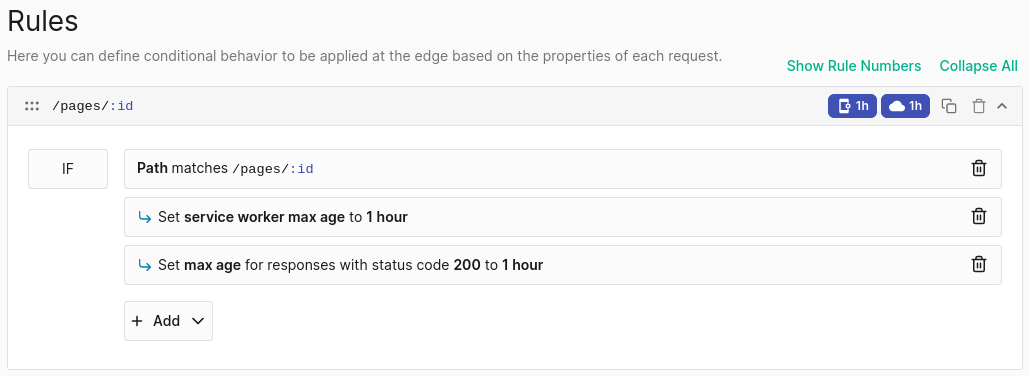Set up predictive prefetching by adding a script tag to all of your pages.
Key information:
-
By default, only content that has already been cached on the POP closest to the user may be prefetched. Edgio returns a 412 Precondition Failed response for prefetch requests that result in cache misses. This ensures that your infrastructure does not experience additional load due to prefetching.
-
Due to security requirements, prefetching requires the HTTPS protocol. An exception to this requirement occurs when using localhost.
-
If you are using Edgio Sites or a JavaScript front-end framework, you can achieve deeper prefetch integration and custom behavior by installing the
@edgio/prefetchpackage. Learn how to install and use this package.
Setup
Perform the following steps:
-
Register the service worker by adding a prefetching script tag to each web page that should support prefetching.
-
Define a caching policy for the set of requests that can be prefetched. This caching policy requires the following features:Alternatively, you may manually enable prefetching for specific requests.
Registering the Service Worker
Prefetching requires a pre-built service worker. Add this service worker by including the following script tag to your existing site’s HTML:
HTML
1<script src="/__edgio__/prefetch/install.js" defer></script>
This script tag installs the latest version of the
@edgio/prefetch package.Alternatively, you may install a specific version of this package by adding the version to the script tag as shown below.
The lowest supported version is
v7.3.1.HTML
1<script src="/__edgio__/prefetch/v7.3.1/install.js" defer></script>
Example:
HTML
1<html>2<head>3 <title>My awesome site</title>4</head>5<body>6 <h1>My awesome page</h1>7 <p>This site uses the @edgio/prefetch package.</p>89 <script src="/__edgio__/prefetch/install.js" defer></script>10</body>11</html>
This package supports the following attributes:
| Attribute | Description | Default |
|---|---|---|
data-include-cache-misses | Set to true to enable prefetching from the origin when a cached response is not found. | false |
data-force-prefetch-ratio | Determines the probability that a request will be prefetched from the origin when a cached response is not found. This attribute is ignored when the data-include-cache-misses attribute has been enabled. Valid values are: 0 - 1. For example, set it to 0.5 to enable this behavior for 50% of the requests. | 0 |
Example:
HTML
1<script src="/__edgio__/prefetch/install.js" data-include-cache-misses="true" defer></script>
Automatic Prefetching
Edgio will attempt to prefetch links when all of the following conditions have been met:
- The @edgio/prefetch script has been included on the page that contains the desired link.
- The desired link is displayed in the viewport (i.e., the area of the web page that is currently visible to the user).
- The desired link matches at least one rule that contains both of the following features:
Prefetch requests are given the lowest priority. This ensures that they do not block more critical requests like API calls, images, scripts, and navigation.
By default, the response varies according to whether the requested content has been cached within the POP closest to the user.
-
If a cached response is found, then Edgio will serve this cached content to the browser. The browser will then cache it locally for the duration defined by the Set Service Worker Max Age (service_worker_max_age) feature.
-
If a cached response is not found, then Edgio will return a 412 Precondition Failed response.Override this behavior by enabling the
data-include-cache-missesattribute.
Example:
HTML
1<html>2<head>3 <title>My awesome site</title>4</head>5<body>6 <h1>My awesome page</h1>7 <p>This site uses the @edgio/prefetch package.</p>8 <nav>9 <a href="/pages/1">Page 1</a>10 <a href="/pages/2">Page 2</a>11 <a href="/pages/3">Page 3</a>12 </nav>1314 <script src="/__edgio__/prefetch/install.js" defer></script>15</body>16</html>
Add the following rule to cache and prefetch all navigation links in the above example:
-
Rules:

-
CDN-as-Code:JavaScriptroutes.js1import { Router } from '@edgio/core/router'23export default new Router()4 // This rule's path matches the navigation links href attribute5 .match("/pages/:id", {6 caching: {7 max_age: "1h", // Caches the response on the edge for 1 hour8 service_worker_max_age: "1h" // Enables automatic prefetching and caches the response in the browser SW cache for 1 hour9 }10 })
Verify that links are automatically prefetched and cached locally by opening the Network tab of your browser’s developer tools (F12).

Manual Prefetching
Call the Edgio.prefetch() function from your code to manually prefetch resources.
Example:
HTML
1<html>2<head>3 <title>My awesome site</title>4</head>5<body>6 <h1>My awesome page</h1>7 <p>This site uses the @edgio/prefetch package.</p>8 <nav>9 <a href="/pages/1">Page 1</a>10 <a href="/pages/2">Page 2</a>11 <a href="/pages/3">Page 3</a>12 </nav>1314 <script src="/__edgio__/prefetch/install.js" defer></script>15 <script>16 document.addEventListener('DOMContentLoaded', () => {17 const { prefetch } = Edgio;18 prefetch('/static/img/my-image.png');19 prefetch('/static/img/another-image.png', 'image', {20 // Override service_worker_max_age config for this call21 maxAgeSeconds: 60 * 60 // 1 hour22 });23 });24 </script>25</body>26</html>